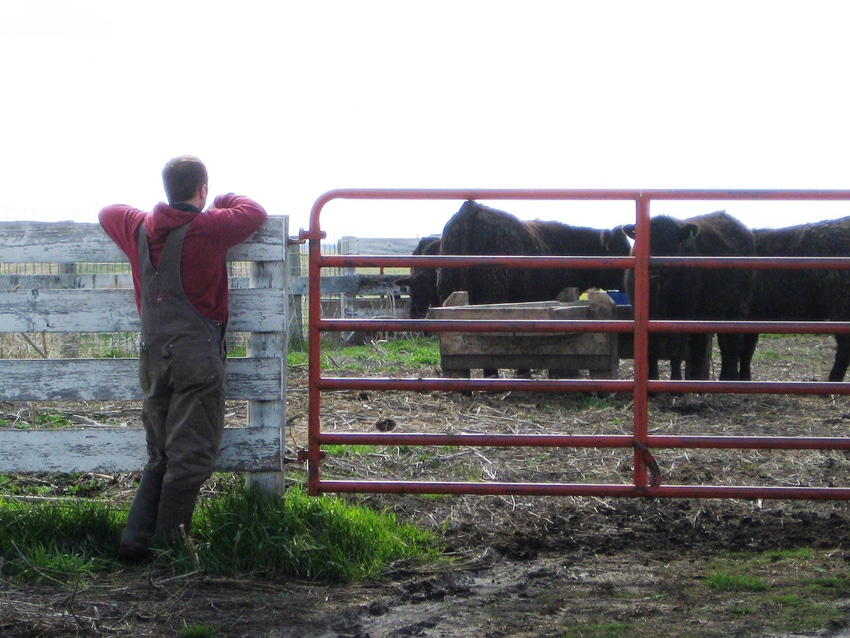Mental health in ag: The elephant in the room
As a stressful 2020 continues, we must ask ourselves and our peers in agriculture — are you OK? Here are some resources to help during these challenging times.
June 17, 2020

Mental health in agriculture is often the elephant in the room. When it comes to handling stress, the stereotypical tough and stoic cowboy from a western movie comes to mind.
While I do believe it’s good to have grit and tenacity to weather tumultuous times, the reality is that the physical and emotional strain of chronic stress can be hard on families, on a marriage, on friendships and on the business.
Without question, 2020 has been a rollercoaster that absolutely nobody asked to ride. However, the wheels keep spinning on the tracks, and if you’ve got anxiety bracing yourself for what’s next in this election year, trust me, you’re not alone.
If your family and your business are facing difficult times right now, I get it. With so many variables outside of our control, the financial upheaval along with the physical and mental weight of working hard day in and day out to make ends meet, all while being a great parent or spouse or family member — well, it can be a lot to deal with.
Combine that with grappling with concerns about a novel virus impacting the entire planet and trying to keep your family safe while also making a living, it’s no wonder everybody is tired, crabby, stressed, angry and depressed these days.
Today, let’s look at this topic straight on. To help us out, here are a few articles I’ve come across lately that offer some food for thought on mental health and wellness in the agricultural community.
The first is titled, “Taking stock of our mental and emotional well-being,” written by Stephanie Plaster for the Wisconsin State Farmer.
Plaster writes, “Conversations that address emotional topics can be challenging. Deepening our conversations and the ways we communicate can help us better figure out the kind of support needed. It allows us to strengthen our relationships and builds trust with those we are seeking to support. Communication is about more than what you say. It's about how you listen, respond, and react both verbally and non-verbally.”
Plaster offers tips for constructive conversations. Click here to read the article in its entirety.
Another interesting article comes from Canadian farmer and family business coach, Elaine Froese. In a post titled, “The importance of relaxation: Why it’s good for you and the farm,” Froese gives us permission to press pause and just take a break once in a while to benefit our mental health and overall well-being.
Froese writes, “The evolution of farming and American work habits, in general, have progressed to the point where the time for relaxation is a scarce commodity. Studies have shown that Americans have added the equivalent of seven weeks to their annual work schedule since 1970 through longer work hours and less vacation time.
“If there were 25 hours in a day, how would you spend that extra hour? Would you cram in another hour of work or would you take time for yourself and relax? Before you answer, consider this: According to studies conducted on stress and its polar opposite, relaxation, those who are less stressed and more relaxed live longer with fewer health problems.”
Check out Froese’s tips for carving out some extra time to take care of yourself and relieve stress by clicking here.
Finally, I recently learned about a bill called the Home-Based Telemental Health Care Act of 2020 (S. 3917), which was introduced by U.S. Senators Mike Rounds (R-S.D.) and Tina Smith (D-Minn.).
The bill would provide grants through a coordinated effort between Health and Human Services and USDA’s Rural Health Liason to support home-based telemental health care demonstrations. The $10 million fund would provide increased mental health services in rural medically underserved populations and would benefits folks working in farming, fishing and forestry occupations.
Learn more about this bill by clicking here.
Moral of the story — today, I hope you can find a minute or two to take a break and do something that will benefit your well-being, your friendships, your marriage or your relationship with your children or parents.
At the end of the day, we know the work is critical to the survival of your business and livelihood. But your health and mental fitness are critical to your overall happiness and the joy you can bring to others, as well. Take care, my friends, and thanks for reading.
The opinions of Amanda Radke are not necessarily those of beefmagazine.com or Farm Progress.
About the Author(s)
You May Also Like




.png?width=300&auto=webp&quality=80&disable=upscale)
